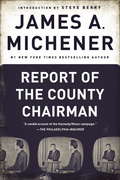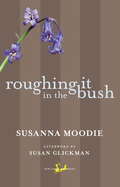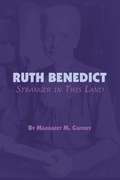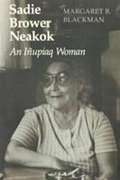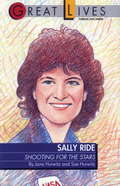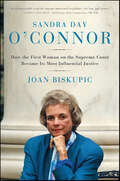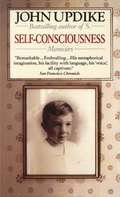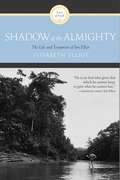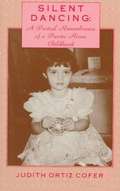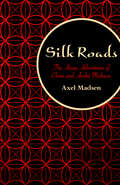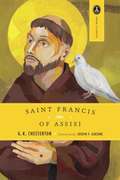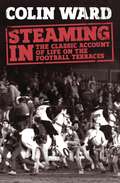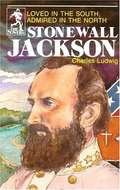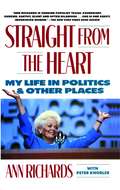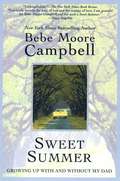- Table View
- List View
Reader's Digest Great Biographies: Mark Twain and Christopher Columbus
by Charles NeiderBiographies of Mark Twain and Christopher Columbus.
Ready, Aim, Fire!: The Real Adventures of Annie Oakley
by Ellen LevineThis book is a biography of the famous sharpshooter who toured the country in Buffalo Bill's Wild West Show.
Report of the County Chairman
by James A. Michener Steve BerryJames A. Michener, the acclaimed author of sweeping historical blockbusters, chronicles his personal involvement in one of the most dramatic elections of the twentieth century: the presidential race between John F. Kennedy and Richard Nixon. A relative newcomer to politics, Michener served as the Democratic chairman in his native Bucks County, Pennsylvania, in a rural battleground precinct where the major controversies of the day--notably Kennedy's Catholicism--brought cultural divides to the forefront. First published shortly after the 1960 election, Report of the County Chairman remains an intimate, gripping account of the power of grassroots political involvement. BONUS: This edition includes an excerpt from James A. Michener's Hawaii.
Reverberations: The Memoirs of Dietrich Fischer-dieskau
by Dietrich Fischer-DieskauThe memoirs of Dietrich Fischer-Dieskau, a great opera and Lieder singer. He shares his penetrating insights into music, his painstaking preparations for the roles he has made his own, his acute assessments of his famous contemporaries, and how he has dealt with stunning public triumph and overwhelming personal tragedy. Born 1925, died 2012, his recordings of Schubert, Schumann and Hugo Wolf songs are still widely available today.
Roseanne: My Life As A Woman
by Roseanne BarrShe was the creator and star of America's #1 TV show-55 million Americans watched her every week. But none of you know the real Roseanne Barr-none of you know, unless you've read Roseanne: My Life as a Woman. From her childhood as a Jewish outcast in the strict Mormon society of Salt Lake City, Utah, to the pinnacle of success as television's newest and funniest star, Roseanne Barr's life story has been one of tremendous drama. Yet, through it all, her indomitable spirit and sharp wit have shone through. With this, her autobiography, she proves herself to be not only a terrific comedian but a wonderful writer and storyteller as well. Vogue said "she flings truth on the table like a TV dinner," and, after reading a few pages of Roseanne, you'll know: The truth will be flung tonight. Here you'll learn the truth about her horrifying, near-death experience as a teenager; her stay in a mental institution; and her escape from Utah. Here's the truth about her early years as a mother, a member of the working poor, struggling to raise a family in a trailer park. You'll read of the great people in her life who gave her the courage to follow her feelings and be true to herself; you'll learn what a beginner in show business has to do to get ahead; you'll read about her Woody Allen and Mel Gibson fantasies, and the drive it takes to keep going in the hard and tough world of Hollywood. Roseanne's life is the story of a woman who started with nothing, overcame great adversity, and with the strength of her convictions - and a brilliant wit triumphs. But most important, here, for the first time, is the real Roseanne; the woman whose spirit and love for life, whose honesty and passion are on every page of this startling, funny, and remarkable autobiography.
Roughing It in the Bush
by Susanna Moodie Susan GlickmanRoughing It in The Bush chronicles Susanna Moodie's harsh and often humorous experiences homesteading in the woods of Upper Canada. A frank and fascinating account of how one woman coped, not only with a new world, but with a new self, this unabridged text continues to justify the international sensation it caused when it was first published in 1852.
Ruth Benedict: Stranger in This Land
by Margaret M. CaffreyPoet, anthropologist, feminist--Ruth Fulton Benedict was all of these and much more. Born into the last years of the Victorian era, she came of age during the Progressive years and participated in inaugurating the modern era of American life. Ruth Benedict: Stranger in This Land provides an intellectual and cultural history of the first half of the twentieth century through the life of an important and remarkable woman. As a Lyricist poet, Ruth Benedict helped define Modernism. As an anthropologist, she wrote the classic Patterns of Culture and at one point was considered the foremost anthropologist in the United States--the first woman ever to attain such status. She was an intellectual and an artist living in a time when women were not encouraged to be either. In this fascinating study, Margaret Caffrey attempts to place Benedict in the cultural matrix of her time and successfully shows the way in which Benedict was a product of and reacted to the era in which she lived. Caffrey goes far beyond providing simple biographical material in this well-written interdisciplinary study. Based on exhaustive research, including access for the first time to the papers of Margaret Mead, Benedict's student and friend, Caffrey is able to put Benedict's life clearly in perspective. By identifying the family and educational influences that so sharply influenced Benedict's psychological makeup, the author also closely analyzes the currents of thought that were strong when Victorianism paralleled the Modernism that figured in Benedict's life work. The result is a richly detailed study of a gifted woman. This important work will be of interest to students of Modernism, poetry, and women's studies, as well as to anthropologists. Poet, anthropologist, feminist - Ruth Fulton Benedict was all of these and much more. Born into the last years of the Victorian era, she came of age during the Progressive years and participated in inaugurating the modern era of American life. Ruth Benedict: Stranger in This Land provides an intellectual and cultural history of the first half of the twentieth century through the life of an important and remarkable woman. As a Lyricist poet, Ruth Benedict helped define Modernism. As an anthropologist, she wrote the classic Patterns of Culture and at one point was considered the foremost anthropologist in the United States - the first woman ever to attain such status. She was an intellectual and an artist living in a time when women were not encouraged to be either. In this fascinating study, Margaret Caffrey attempts to place Benedict in the cultural matrix of her time and successfully shows the way in which Benedict was a product of and reacted to the era in which she lived. Caffrey goes far beyond providing simple biographical material in this well-written interdisciplinary study. Based on exhaustive research, including access for the first time to the papers of Margaret Mead, Benedict's student and friend, Caffrey is able to put Benedict's life clearly in perspective. By identifying the family and educational influences that so sharply influenced Benedict's psychological makeup, the author also closely analyzes the currents of thought that were strong when Victorianism paralleled the Modernism that figured in Benedict's life work. The result is a richly detailed study of a gifted woman. This important work will be of interest to students of Modernism, poetry, and women's studies, as well as to anthropologists.
Rutherford B. Hayes: Nineteenth President of the United States
by Neal E. RobbinsFollows the life of Rutherford B. Hayes, including his childhood, education, employment, political career, and term of presidency.
Sadie Brower Neakok: An Inupiaq Woman
by Margaret B. BlackmanThis is the life history of the daughter of Asianggataq, an Eskimo woman, and her husband Charles Bower, the first white settler in Alaska's northernmost community of Barrow. One of ten children, Sadie Brower was raised with a mixture of Inupiat and white traditions. Sent Outside for modern schooling, she returned to Barrow to use her education on behalf o her people. Now in her seventies, she has devoted a lifetime to public service, first as a Bureau of Indian Affairs schoolteacher, than as a health aide, a foster parent, a welfare worker, and, for twenty years, as Barrow's magistrate. She became a key figure in the introduction of the American legal system to bush Alaska as well as an outspoken advocate for people, eventually winning the right for the native language to be the language of the court in cases where the defendants could not speak English. Equally important, in private life she has borne thirteen children as wife to Nate Neakok, an Inupiaq hunter and whaling captain who, she states emphatically, ?never went to school, but know more than I did, a college student, a teacher. ' Professor Blackman places Sadie Neakok's vivid narrative within the context of the recent history of Barrow and Alaska? North Slope, interweaving cultural and historical data from various sources with Sadie's own perspectives on herself, her people, and the outside world that has increasingly affected them. Blackman's concluding chapter offers a perceptive critical evaluation of the life history process itself. The book makes an important contribution to Alaskan cultural and legal history, to life history methodology, and to studies of women in cross-cultural perspective.
Sally Ride
by Sue HurwitzSally RideShooting for the StarsAstronaut Dr. Sally Ride took a deep breath and nervously waited as the powerful engines of the Space Shuttle Challenger roared to life. This was the most frightening, yet exciting moment of Sally's life! She was determined to prove that an American woman could perform in space as well as a man.Countdown to History!Sally Ride: Shooting for the Stars profiles the life of America's first woman astronaut to fly in space. Jain Sally's astronaut training as she learns to fly jets, practices sea rescue missions, and floats weightlessly in a special "zero gravity" aircraft. Witness her breathtaking view of Earth from 184 miles out in space while traveling aver 17,400 miles per hour! Then dare to share her dream of joining NASA's astronaut program.From the Trade Paperback edition.
Sandra Day O'Connor: How the First Woman on the Supreme Court Became Its Most Influential Justice
by Joan Biskupic“Sandra Day O’Connor takes you behind the closed doors of the Supreme Court to reveal how Justice O’Connor helped craft landmark decisions on abortion, affirmative action, and a host of other critical issues. Joan Biskupic has broken new ground in reporting on O’Connor’s life and historic role on the high court. This lively, fast-paced account will make people rethink how they view this extraordinary woman and her fellow justices. An indispensable read for anyone interested in politics, the law, and power as exercised by one of the most fascinating women of our time.” -Andrea MitchellSandra Day O'Connor, America's first woman justice, became the axis on which the Supreme Court turned. She was called the most powerful woman in America, and it was often said that to gauge the direction of American law, one need look only to O'Connor's vote. Then, just one year short of a quarter century on the bench, she surprised her colleagues and the nation by announcing her retirement.Drawing on information from once-private papers of the justices, hundreds of interviews with legal and political insiders, and the insight gained from nearly two decades of covering the Supreme Court, Joan Biskupic examines O'Connor's remarkable career, providing an in-depth account of her transformation from tentative jurist to confident architect of American law. The portrait that emerges is of a complex and multifaceted woman: lawyer, politician, legislator, and justice, as well as wife, mother, A-list society hostess, and competitive athlete. To all appearances, she was the polite lady in pearls, handbag on her arm. But in the back rooms of politics and the law, she was a determined, focused strategist. O'Connor was the feminist who, rather than rebel against the male-dominated system, worked from within -- and succeeded.As Biskupic demonstrates, Justice O'Connor became much more than a "first." During her twenty-four-year tenure, she wrote the decisions on some of the most controversial social battles of our time. O'Connor's tie-breaking opinions on issues such as abortion rights, affirmative action, the death penalty, and religious freedom will have a lasting effect far into the future. O'Connor also cast one of the five votes that cut off the Florida recounts and allowed George W. Bush to take the White House in the 2000 contested presidential election. With an eye to the American people and a keen sense of public attitudes, she worked behind the scenes to shape the law and transform the legal standards by which future cases will be decided.From O'Connor's isolated upbringing on the Lazy B ranch in Arizona through her time as a state legislator to her rise as a justice -- along the way confronting her own personal challenges and crises, including breast cancer -- Biskupic presents a vivid, astute depiction of the justice -- and of the woman beneath the black robe. In so doing, Sandra Day O'Connor also provides an unprecedented look inside the exclusive, famously secretive High Court.
Schrödinger: Life and Thought
by Walter MooreIn the first comprehensive biography of Erwin Schrödinger--a brilliant and charming Austrian, a great scientist, and a man with a passionate interest in people and ideas--the author draws upon recollections of Schrödinger's friends, family and colleagues, and on contemporary records, letters and diaries. Schrödinger led a very intense life, both in his research and in the personal realm. This book portrays his life against the backdrop of Europe at a time of change and unrest. His best known scientific work was the discovery of wave mechanics, for which he was awarded the Nobel Prize in 1933. In Dublin, he wrote his most famous and influential book What is Life?, which attracted some of the brightest minds of his generation into molecular biology. This highly readable biography of a fascinating and complex man will appeal to anyone interested in the history of our times, and in the life and thought of one of the great men of twentieth-century science.
Self-Consciousness: Memoirs
by John UpdikeJohn Updike's memoirs consist of six Emersonian essays that together trace the inner shape of the life, up to the age of fifty-five, of a relatively fortunate American male. The author has attempted, his Foreword states, "to treat this life, this massive datum which happens to be mine, as a specimen life, representative in its odd uniqueness of all the oddly unique lives in this world." In the service of this metaphysical effort, he has been hair-raisingly honest, matchlessly precise, and self-effacingly humorous. He takes the reader beyond self-consciousness, and beyond self-importance, into sheer wonder at the miracle of existence.
Shadow Of The Almighty: The Life & Testament Of Jim Elliot
by Elisabeth ElliotShadow of the Almighty is one of the great missionary stories of modern times. It is the life and testament of Jim Elliot, as told by Elliot’s widow, author and evangelist Elisabeth Elliot Gren. Shadow of the Almighty is the true account of Elliot's martyrdom, along with four fellow missionaries, at the hands of Ecuador’s Huaorani Indians. About this important and enlightening book, Eugenia Price writes, “It proves that Jesus Christ will bring bright creativity out of any shadow which might fall across any life and any love.” A story that has inspired Christian readers for more than half a century, it poignantly recounts a tragic event that was presented from Huaorani perspective in the 2006 feature motion picture, End of the Spear.
Silent Dancing: A Partial Remembrance of a Puerto Rican Childhood
by Judith Ortiz CoferSilent Dancing is about a young girl as she struggles through life, constantly being moved from the U.S. to Puerto Rico, and back again.
Silk Roads
by Axel MadsenOne of the greatest art theft stories of the 20th century: André Malraux, French novelist, art theorist, and eventually France's Minister of Cultural Affairs, and his wife, Clara, traveled to Cambodia in 1923, planning to steal and smuggle artifacts out of the country and sell them in America. The Cambodian treasure hunt promised to be a mix of cultural sleuthing for important antiquities and risk-taking on the fuzzy edge of the laws that governed historical sites. The jungle expedition ended in arrest and, for André, trial and conviction. But it also led to a second Asian venture: the launching of a Saigon newspaper, L'Indochine, dedicated to the aspirations of the indigenous population. Madsen follows the couple from this fateful adventure that so shaped their future to the end of their marriage, and after.
Sketches from a Life
by George F. KennanWritten originally as a series of entries in a travel diary and now considered one of the important memoirs of the time, national bestseller "Sketches from a Life" is Kennan's, impressionistic record of his experiences with 20th-century history.
St .Francis of Assisi
by G. K. ChestertonFrancis of Assisi is, after Mary of Nazareth, the greatest saint in the Christian calendar, and one of the most influential men in the whole of human history. By universal acclaim, this biography by G. K. Chesterton is considered the best appreciation of Francis's life--the one that gets to the heart of the matter. For Chesterton, Francis is a great paradoxical figure, a man who loved women but vowed himself to chastity; an artist who loved the pleasures of the natural world as few have loved them, but vowed himself to the most austere poverty, stripping himself naked in the public square so all could see that he had renounced his worldly goods; a clown who stood on his head in order to see the world aright. Chesterton gives us Francis in his world-the riotously colorful world of the High Middle Ages, a world with more pageantry and romance than we have seen before or since. Here is the Francis who tried to end the Crusades by talking to the Saracens, and who interceded with the emperor on behalf of the birds. Here is the Francis who inspired a revolution in art that began with Giotto and a revolution in poetry that began with Dante. Here is the Francis who prayed and danced with pagan abandon, who talked to animals, who invented the creche.
Stonewall Jackson: Loved in the South; Admired in the North
by Charles LudwigA biography of the Confederate general who gained the nickname Stonewall for his stand at the first batle of Bull Run during the Civil War.
Straight From the Heart
by Ann RichardsFormer Texas Governor Ann Richards describes her early political career, civil rights activism, and family and personal life. Enjoy the humor and insight displayed in her public appearances.
Straight from the Heart
by Ann RichardsStraight from the Heart is Ann Richards's story, told with her trademark candor and spicy humor.Born in a tiny town near Waco, Texas, she entered politics when her husband wouldn't--and went on to become state treasurer, the first woman elected to statewide office in Texas in fifty years. She's had her victories and her battles (the breakup of a thirty-year marriage and a bout with alcohol), but it's her love of Texas and Texas politics that has made her who she is. This extraordinary memoir by one of the nation's leading politicians proves the wisdom of her observation that women "can have a good and wonderful life, but that it only begins when they accept responsibility for it, not when they expect someone else to make it happen." Richards talks openly about the course her life has taken and the choices she has made on the way. Her hard-won triumphs and savvy political career provide inspiring examples for all.
Super Sleepover Guide (Sleepover Friends)
by Susan Saunders(From The Back Cover) Have fun losing sleep! Want to have your own super sleepover? Let Kate, Lauren, Patti, and Stephanie show you how. Along with plenty of tips on how to set up a fail proof sleepover, each Sleepover Friend has a chapter of her own. You'll find sleepover favorite recipes, such as Kate's Chocolate Marshmallow Super-fudge, or the Banana Smoothies that Lauren likes. You'll learn how to throw a New Look Sleepover, like Patti, or go for the thrills and chills of Stephanie's Supernatural Sleepover. Or invent your own! With the Super Sleepover Guide, you'll never lose sleep over a sleepover party again!
Sweet Summer
by Bebe Moore CampbellAs a child, Bebe Moore spent her school years in Philadelphia, in a world of women. Surrounded by clouds of Emeraude and Chanel, supported by the strength of her mother, grandmother, aunts, and teachers, she learned by example to mind her p's and q's, to cross her t's and dot her i's. But when summer came, Bebe was sent down South to live with her father -- an extraordinary man who allowed no disability or disadvantage to stop his dreams, and whose powerful presence added a different dimension to his daughter's life. Now, in this acclaimed memoir, the bestselling author of such novels as Brothers and Sisters remembers those sweet summers and shares the bittersweet experience of growing up in 1960s America, finding a place in the world -- and discovering that family may be separated, but it can never be truly divided.

